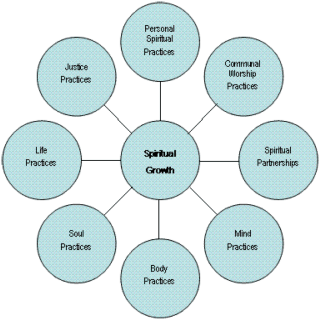Handout 2: Eight Spheres of Spiritual Growth

Tapestry is Sunsetting
The UUA is no longer updating Tapestry of Faith programs.
Personal Spiritual Practices: These are practices done alone and, perhaps, daily—such as meditation, dream work, journaling, prayer, and so on. They’re what most people think of when they hear the words “spiritual practice.”
Communal Worship Practices: Although Unitarian Universalists affirm the uniqueness and individual nature of a person’s spiritual path, our movement is also founded on a belief that community is essential to that journey. Regular engagement with communal worship—the ongoing and collective search for truth and meaning—is one way of supporting this belief.
Spiritual Partnerships: Spiritual development is hard work, and most faith traditions affirm the usefulness of companions on the journey. A spiritual partnership can take the form of participation in a small group, a one-on-one relationship with another congregant, spiritual guidance with a minister, or one’s own personal therapy. What matters most is the intentional relationship with another person and a mutual commitment to the journey.
Mind Practices: Could a program of spiritual development be Unitarian Universalist without an intellectual component? This is a role of adult religious education: book studies, film discussions, lectures, adult forums, scripture studies, courses in UU history, and other RE offerings are all ways to fulfill this dimension of a “rich, integrated program.”
Body Practices: We know that mind, body, and soul are interconnected. Doesn’t it make sense, then, that a well-rounded spiritual practice includes some kind of physical practice? It might be running, sitting, gardening, tai chi, massage, or virtually anything else that keeps us in touch with the miracle of our physical selves.
Soul Practices: These are the practices that exercise our creative selves—drawing, painting, sculpting, music, poetry, and other creative endeavors. It has been said that the Biblical expression that humans are “made in the image of God” means that we are made to be creative.
Life Practices: Religious traditions from around the world agree that we eventually need to take what we do in private and in our congregations and bring it out into the rest of our lives—in our relationships with our family members, in our workplaces, in our interactions with strangers.
Justice Practices: A fully mature spirituality does not stop at the goal of transforming oneself, but must extend beyond oneself—to others—and include a vision of transforming the world.
